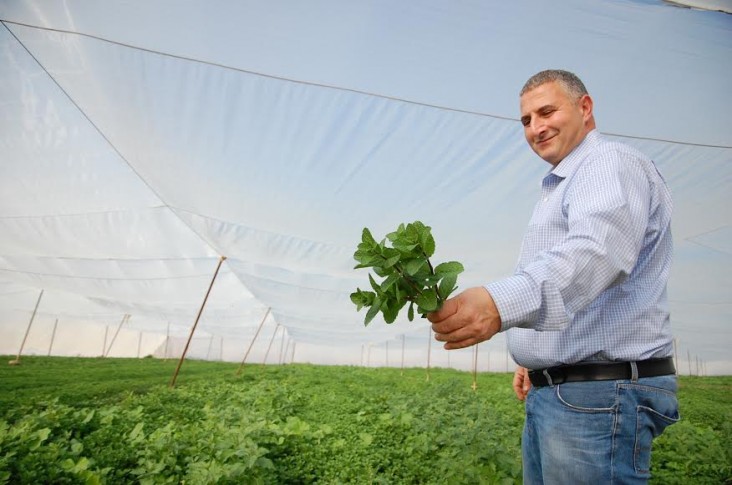
June 2014—The fertile soil of the West Bank provides an ideal landscape for dozens of Palestinian fresh herb companies to grow their crops. Most of these companies aim to export their products to the global market, but not all of them have the tools and resources needed to meet global standards and demands.
Imad Nussiebeh is a certified agronomist and the CEO of Thimar, a company that grows and exports herbs and vegetables on the outskirts of the West Bank town of Jericho. “The agriculture sector isn’t easy and has a lot of risks. Many things, from the weather to political issues, affect pricing and production,” he says about his chosen profession.
Recognizing the potential of the Palestinian agricultural sector for economic development, USAID engaged with local partners in 2008 to better determine how to expand the sector. After identifying fresh herbs as a high potential product, the partnership worked with local businesses to grow them through a pilot program.
The project proved highly successful as the demand for fresh herbs was huge in both the United States and Europe. Not surprisingly, more farmers wanted to grow fresh herbs. USAID worked with five farmers to replicate the pilot project, and within three years, the number of herb farmers in the West Bank rose from five to 23.
With guidance from USAID, the herb producers banded together in 2013 to form a nonprofit collective that markets and exports fresh herbs, increasing the reach of their individual farms. USAID helped the growers work together to calibrate which and how much herbs to grow.
“USAID brought us together. We are not competitors,” Nussiebeh says of the collective, whose farmers grow basil, sage, thyme, arugula, rosemary, oregano, coriander, parsley, tarragon, chives and mint.
When pests threatened to halt the export of fresh Palestinian herbs in March 2010, USAID provided technical assistance to help raise the farmers’ product quality to internationally recognized standards, while integrating modern technologies to reduce pest infestation and production costs. Using a $300,000 grant from USAID, the herb farmers installed double doors and netting into greenhouses as added measures to protect against pests, and purchased new refrigerators for their packing house.
Not only does the collective comply with U.S. Department of Agriculture regulations, it has a sanitary and phytosanitary certificate indicating that its goods do not contain living pests and it is now a certified Global GAP (good agricultural practice) producer compliant with global agriculture product certification standards.
The Palestinian fresh herb industry has grown exponentially as a result of USAID’s efforts to develop the agriculture sector and grow the economy. Thimar has gone from plowing 30 acres in 2010 to 173 acres in 2014 and from employing three full-time workers and 25 seasonal workers to employing 150 full-time and seasonal employees throughout the year.
While the Palestinian fresh herb industry was non-existent in 2008, today it employs 1,200 people. In 2013, Palestinian fresh herb exports were valued at $15 million. USAID has helped Palestinian herb producers reach new markets that were previously inaccessible and the collective currently exports to Russia, Ukraine, Germany, Holland, Italy and the United States. New markets for fresh Palestinian herbs are expected in the United States and Canada this year.
Noting that it is not easy to sustain the stability of income from agricultural projects, Nussiebeh stresses the importance of investment. “The agriculture sector is one of the main job providers in the West Bank and investment in agriculture creates jobs,” he said.
With further guidance and support from USAID, the agriculture sector in the West Bank, particularly the fresh herb industry, will continue to develop and grow.
Initiated in 2011, USAID’s Compete Project works with Palestinian businesses, including the fresh herb industry, to help expand export revenues and increase job opportunities to strengthen the country’s economy. The program focuses on promising sectors of the Palestinian economy including agriculture, tourism, information and communication technology, and the stone and marble industries.







Comment
Make a general inquiry or suggest an improvement.